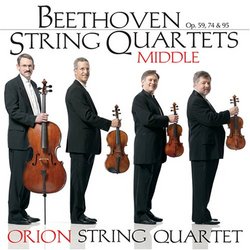Amazon.comString quartet players regard the Beethoven quartets as the pinnacle of the literature, and performing them as the ultimate achievement. Every great quartet has recorded them; this three-CD set is the first volume of the most recent contribution to the discography. The Orion String Quartet, formed in 1987, has long been associated with the Beethoven quartets, and indeed performed them as a gift to New York City for the millennium in six free concerts. This recording captures the players at their technical and communicative peak. They bring so much assurance, authority, freedom, and expressive depth to the music that they seem to have become entirely one with it. All their strengths are on full display: their sovereign instrumental command; their beautiful, warm, variable tone, homogeneous but individually distinctive; their impeccable balance and rapport. Particularly striking is their control of voicing: within a luminous texture, lines stand out and recede naturally and unobtrusively, connecting seamlessly in sound and expression. The Phillips brothers share the group's leadership, giving it two equally strong violinists, a great asset in works with four equally demanding parts. These five quartets are best known by their nicknames: Op. 59, called the "Razumovsky" Quartets after the music-loving Russian ambassador to Austria who commissioned them; Op. 74, called "The Harp" for the pizzicato arpeggios in the first movement; and Op. 95, the most concise of all Beethoven quartets, called "Serioso" for the dramatic, driving tension of its fast movements and the mournful resignation of its slow one. The performances are superb; with total concentration, the players bring out the contrasts of mood and character, the austerity, passion, and serenity of the music. Listeners may not agree with all their interpretive choices (for example, their eventually too predictable tendency to broaden the crescendos preceding subito pianos, and pause before the drop in dynamics), but this detracts nothing from the impact of these carefully thought out, deeply felt, splendidly executed performances. --Edith Eisler


 Track Listings (8) - Disc #1
Track Listings (8) - Disc #1